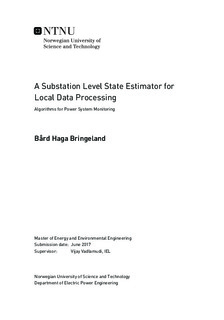A Substation Level State Estimator for Local Data Processing - Algorithms for Power System Monitoring
Master thesis
Permanent lenke
http://hdl.handle.net/11250/2453621Utgivelsesdato
2017Metadata
Vis full innførselSamlinger
- Institutt for elkraftteknikk [2412]
Sammendrag
Modelling power systems with substation details in State Estimation (SE) has several advantages. An increased measurement redundancy is possible, because the measurements can be evaluated individually instead of being aggregated to the bus-branch level. Conventional SE methods, relying on bus-branch models, cannot provide an efficient topology error processing. Though Generalised State Estimation (GSE) overcomes this limitation, with its built-in ability to estimate the state of the system by using node-breaker models, the problem size and solution times render it infeasible to build an estimator based on centralised GSE for real-time monitoring of large power systems. A reasonable trade-off for the design of an efficient state estimator for real-time monitoring would be to use a two-level method: - Level 1: In the substation level, a local SE is performed by utilising only some of the salient features of the GSE algorithm.- Level 2: The validated pre-processed measurements obtained as output of Level 1 are then fed to a SE processor at the Transmission System Operator (TSO)-level, which runs on the conventional SE algorithm.
The central research question investigated in this thesis is whether or not a suitably designed substation level state estimator, naturally restricted in size, is able to retain the same advantages as the centralised state estimator based on GSE with respect to accuracy, bad data, and topology error processing.
Based on extensive literature survey and critical analysis of its consequent findings, this thesis provides the conceptual basis for a two-level state estimation: linear and computationally non-demanding substation level estimation, based on GSE, integrated with conventional state estimation at the TSO-level. Though the designed framework is mostly theoretical in nature, conceptual tests have been conducted for demonstration and preliminary testing, paving the way for addressing further identified research questions in this area. A modified 14-bus IEEE test system has been employed as the case study of choice for conducting the relevant investigations for realising the proposed two-level state estimator.
The proposed implementation logic and design choices for the two-level state estimator have been presented and executed in MATLAB, including the program needed to perform conceptual testing.
